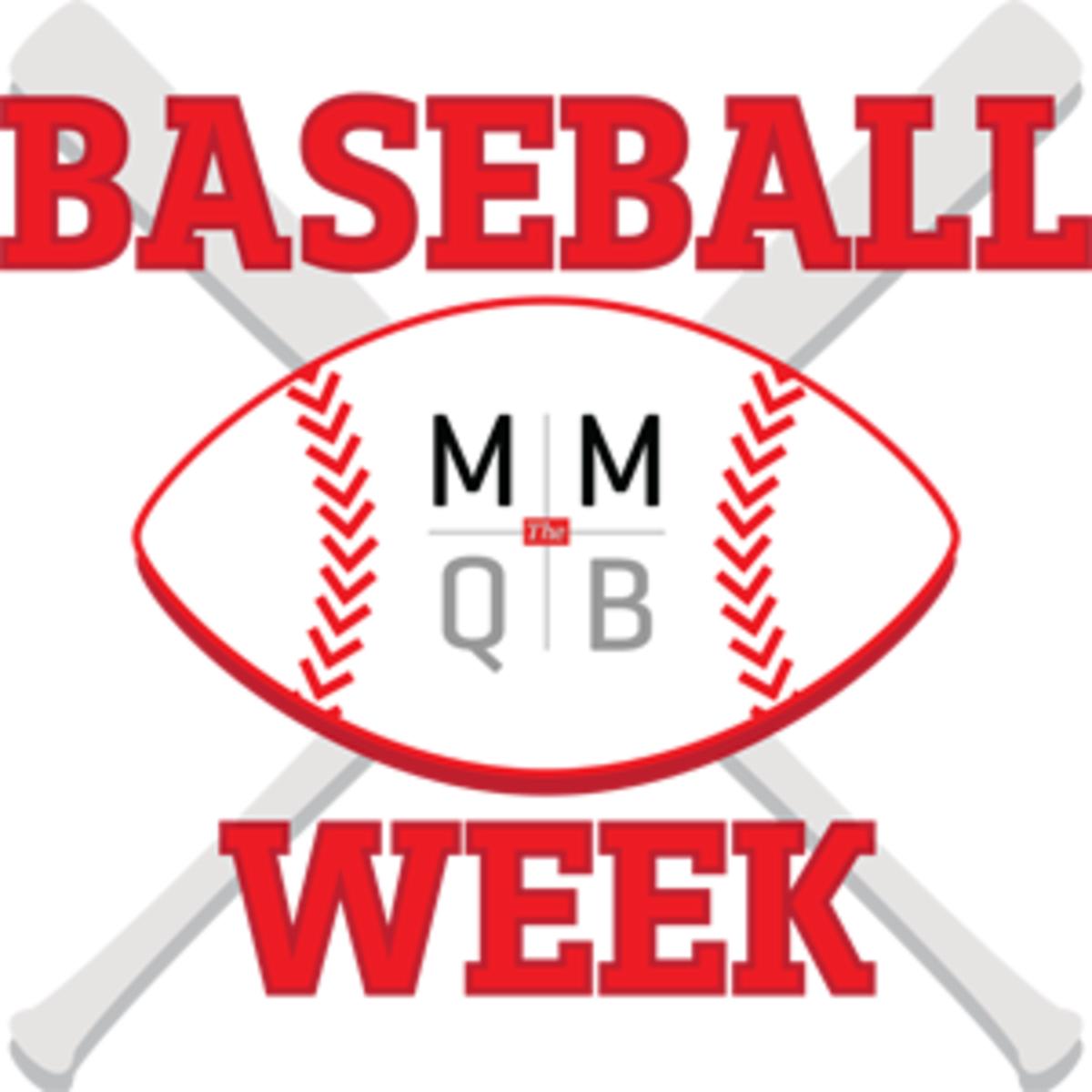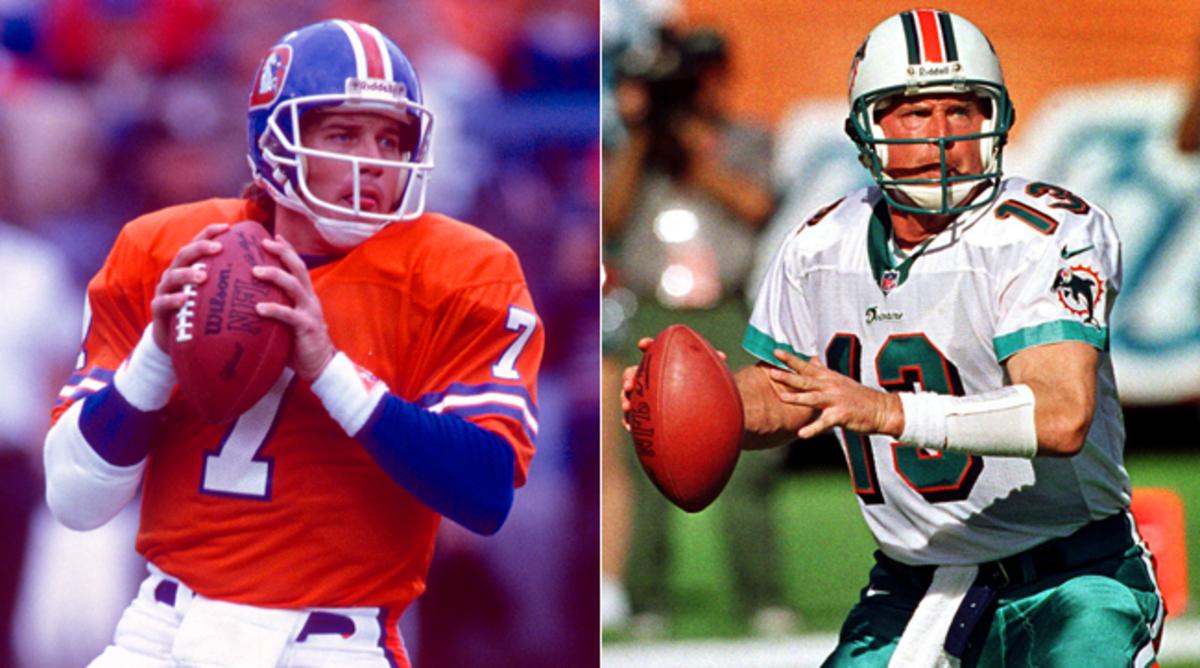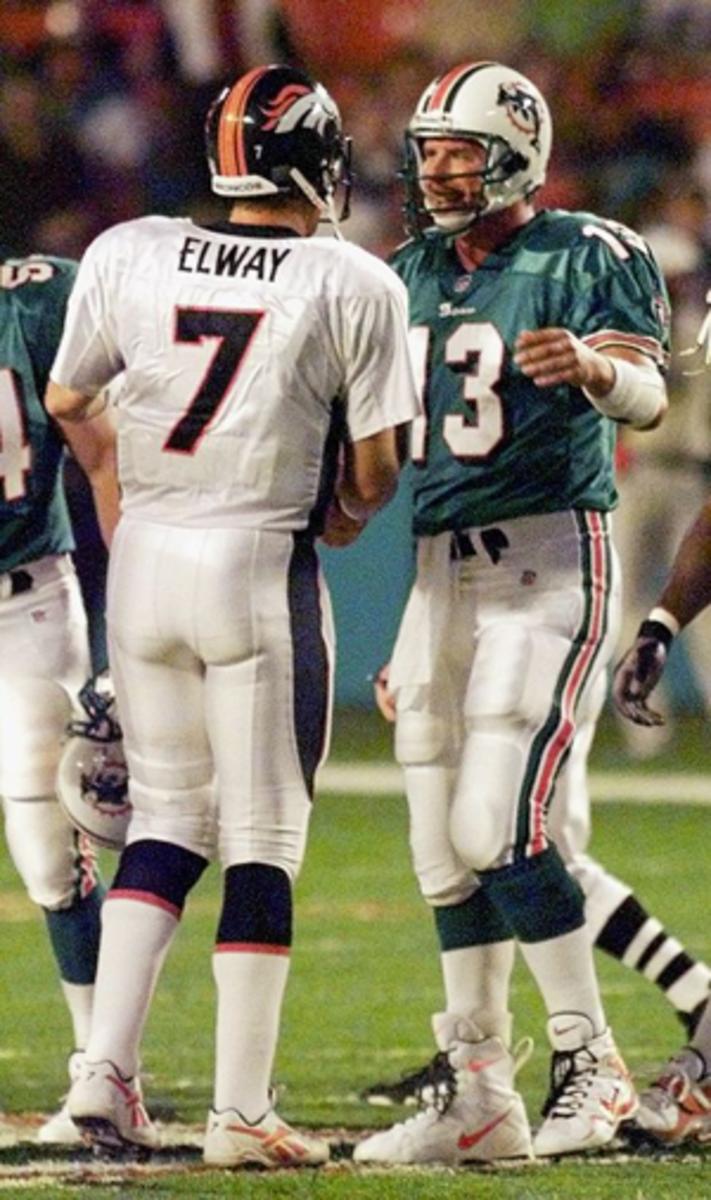Elway and Marino Could Have Been Baseball Royalty

Welcome to Baseball Week. As training camp approaches and baseball takes a break for its mid-summer classic, The MMQB presents a week of stories on the crossover between hardball and football.
Their baseball careers are mere footnotes in their illustrious careers, but in the run-up to the 1979 MLB draft, scouts and coaches thought Dan Marino (fourth round) and John Elway (19th) had a chance to make it in the big leagues. Here’s an oral history according to those who tried to turn these quarterbacks into baseball players.
GEORGE BRETT, Royals third baseman: The Royals draft athletes. You want a guy who played two sports. In high school if you’re an athlete, the basketball coach wants you to play, the football coach wants you to play—everybody wants you to play.
JOHN SCHUERHOLZ, Royals GM: Back in the day, great athletes were still multisport athletes. I had been involved with the [1971] drafting of Archie Manning, who was a very fine baseball player, and of course Bo Jackson [in ’86]. Bo was an outstanding player and would’ve been a star if he’d stayed with it.

ART STEWART, Royals scout:
SCHUERHOLZ, Royals GM: We knew the chances were probably slim. If you just evaluated the amount of national attention they received in one or the other sport, it was easy to recognize their athletic persona was most wrapped up in a football uniform, but we thought we’d try.
STEWART, Royals scout: With Elway we just took a chance. We knew his father didn’t want him to sign coming out of high school, but we thought we might change his mind. We liked his overall ability. He was a shortstop, but we thought he was going to be more conducive to playing third. We liked his bat, he had a strong arm, he had good hands—he was a definite prospect.
• BASEBALL WEEK: The MMQB’s series on the crossover between hardball and football
SCHUERHOLZ, Royals GM: It wasn’t, Let’s get some attention around us by drafting a football player we don’t think we have a snowball’s chance in Hades to sign. It was, If we can sign this guy, does he have a chance to be a legit major league player?
DARRYL STROH, Elway’s high school baseball coach: [Elway] transferred in as a 10th grader. In baseball he started out on the jayvee, because we had a pretty good team coming back. The jayvee baseball coach was the head football coach and partway through the season he told me, You gotta bring this guy up. We brought him up and he started. He hit in the middle of the lineup, and he hit over .500 as a junior and a senior. In those two years he only failed to hit in two ballgames or something. It was ridiculous.
[Elway’s] senior year we weren’t as good as we had been, and John is having to do his share of pitching. He wasn’t a polished pitcher because he spent so much time on football and he didn’t develop breaking pitches because his dad didn’t want him throwing them, so we had problems developing him. Midway through the season he’s pitching and he hits a couple guys, throws balls over batters’ heads, walks three or four, so I went out and took the ball and said, Go to third. You’re not pitching anymore. We finish the season and end up in Dodger Stadium playing Darryl Strawberry’s high school team. We’ve got a guy pitching who gets through about the third inning and he looks real shaky. I’m on my way to the mound to make a change and I think, This is a tough spot. I just had this urge to go with the toughest guy I know. I looked over at third. He hasn’t been on a mound for four to six weeks. Anyway, he two-hit them for the next four or five innings. That’s the kind of guy he was. He’s the toughest guy I know. He’s always been able to battle. He was different.
STEWART, Royals scout: Elway had the potential to play in the big leagues. I think if he’d signed out of high school he’d have made it. There’s nothing wrong with a boy going to college instead of playing pro ball. It depends on the boy, but if he’s physically and mentally ready for pro ball at that young age, the advantage is that he would be facing good pitching every day. If he goes to college, he might see one good pitcher every few weeks. The repetition of that over three years increases the odds of a player being able to get to the big leagues, because he’s facing better competition. His skills will develop if he has the ability.
MARK MARQUESS, Elway’s college baseball coach: That was not going to happen. In his mind and his dad’s mind there was no question he wanted to be an NFL QB. It might have been different if he’d been a wide receiver or a running back and they’d offered him a lot of money out of high school. I didn’t even pay attention to the draft. Normally I’m all over that, because if you have a first-round pick you may not get the kid, but in John’s case I didn’t follow it at all. I don’t think anyone thought he would sign a pro contract out of high school. There was no question, even in high school, that he was going to be an NFL player.
• TIM ROHAN: That Time a 17-Year-Old Tom Brady Borrowed Ken Griffey Jr.’s Jersey
STROH, Elway’s high school baseball coach: My understanding is John went to Stanford because they would allow him to play both sports. That was important to him. If he’d had his choice he would’ve liked to play basketball too.
MARQUESS, Elway’s college baseball coach: My concern was, Was he serious about doing the baseball? I knew he was when he was disappointed he only hit .280 his freshman year. He’d scrimmage with us for two hours at 10 a.m. on a Saturday and play a spring game with the football team at 1 p.m.
BRETT, Royals third baseman: [Shortly after the Royals drafted him], they brought John Elway out in Anaheim and they put him in a group with me, Clint Hurdle and Jamie Quirk. We were taking ground balls at third base before a game against the Angels—they just gave him a uniform and said, Come on—and we all knew he had a great arm, and he had pretty good power, and we’re going, Holy shit, this guy’s better than we are! So we were happy that he chose football over baseball.
SCHUERHOLZ, Royals GM: George was a kidder, but he’s also a very astute evaluator of baseball skills. It might have been a nice line for the media, but I know he believed it.

* * *
JOE EMANUELE, Marino’s high school baseball coach: One time [Marino] was pitching his senior year and in the first inning they load the bases. I call timeout and go out to the mound and look at him—I’m 5’6”, 5’7”, and he’s much bigger than I am—I look up at him and I say, Danny, what are we gonna do? He says, I’m gonna manage this and you’re gonna go sit down. I went and sat down and he got out of it. He always knew exactly what he wanted to do, and he did it.
STEWART, Royals scout: I think Marino’s ceiling was higher than Elway’s. Elway would have been a solid major league player if he’d signed out of high school. Marino was farther along. He had a chance of being an All-Star.
EMANUELE, Marino’s high school baseball coach: He was going to be a Hall of Famer in one of the three: basketball, baseball or football. He chose football.
He was a much better baseball player than football player. He didn’t play at all on the varsity football team until his junior year. Meanwhile he walked right into Central and played baseball right away. When he was a freshman, he was already better than all the juniors and seniors we had. He had to work at being a football player. He didn’t have to work at baseball. It came naturally.
• JENNY VRENTAS: Matt Holliday, the One That Got Away
STEWART, Royals scout: Marino had a cannon for an arm, one of the best arms I’ve ever seen.
EMANUELE, Marino’s high school baseball coach: He was the No. 1 shortstop and as a pitcher he went 22-0 in high school. He never got beat and he never missed a game.
STEWART, Royals scout: Marino wanted to play baseball. He told our scout he’d sign if we let him play football at Pitt. We were all set to sign him, but he informed the school and the officials told him, No, if you sign you can’t play. In those days there was a rule in the Big 10 that stated that a player could sign a pro baseball contract and play college football. That’s what Kirk Gibson did his last year. So in the case of Marino—and nobody realized this, even he didn’t—the Big East had a clause that a player could not sign a pro contract in any other sport and play football at the same time. We just took it for granted that he was going to play both. We were upset. We felt bad. He was a great baseball talent. We felt that he was going be a good big leaguer. Nobody will ever know.
• KALYN KAHLER: Pitching, Kicking, and Gostkowski’s Head Games
SCHUERHOLZ, Royals GM: I had a number of conversations with Marino’s dad. He was quite open-minded. Dan really loved baseball, but these were the days when if you signed any contract you were disqualified from playing all college sports [in the Big East]. So to balance that I began talking to Mr. Marino about how we would be willing to pay 100% of his cost of education because he would have to forgo college football. At the end he finally said to me, We appreciate your efforts, but the right decision is for Dan to go to Pitt to play football.
EMANUELE, Marino’s high school baseball coach: He was 17 years old. There were no assurances that he’d be able to go play Major League Baseball without going through the minors, whereas with football, he could stay home for four years. If the Royals had taken him in the first round he would have gone.
* * *

Marino went to Pitt, where he played exclusively football. The Panthers went 40–6 in his tenure, and the Dolphins selected him with the 27th pick in the 1983 NFL draft. He won the 1984 MVP award and was a nine-time Pro Bowler.
Elway went to Stanford, where he played both sports. He finished second in the 1982 Heisman Tophy voting and went first in the ’83 NFL draft, to the Baltimore Colts. He eventually won an MVP and two Super Bowls for the Broncos before becoming their GM and winning another. He gave pro baseball another shot, signing after his sophomore year with the Yankees and making it as far as Low-A Oneonta as an outfielder.
SCHUERHOLZ, Royals GM: The Yankees probably had the comfort of knowing they had a lot of money to persuade the player. The economics in our game for most organizations were such that it would not be reasonable to gamble a financial buyout to convince somebody to make a choice of our sport versus another sport. And time is precious. There’s no sense dancing around the maypole.
• ROBERT KLEMKO: Where Have All the Deions Gone?
MARQUESS, Elway’s college baseball coach: [Elway] was Tim Tebow but a lot better baseball player. He had the greatest arm I ever saw as a baseball player. In pro baseball you’re just drafting him based on the tools.
STEWART, Royals scout: It gets harder as they get older. I can’t tell you if Tim Tebow can make it or not, but the odds are tough at the age of 27. If Tebow makes it, it’ll be unprecedented in the history of baseball. Michael Jordan was a good-looking major league prospect in high school. You know the story there: He didn’t get above Class AA. The biggest reason it’s tougher for a good athlete to make it at that age is the hitting aspect. The reactions you have as a young man aren’t quite there as you get older.
EMANUELE, Marino’s high school baseball coach: I joined the Royals in 1981 [as a scout]. I was hoping [Marino] would sign a baseball contract after his junior year of college, but by then he was so far gone as a football player.
• ANDREW BRANDT: Why Baseball Has More Money Power than Football
STEWART, Royals scout: We followed them both through college. We couldn’t forecast how the NFL draft would turn out, so we still kept an eye on them. You have feelings like, Ah, they could’ve been with us in the big leagues! But then by the same token, we were happy to see the success that they had. And it just told us all the more that we were right on the money on these boys’ makeup and ability to be successful.
SCHUERHOLZ, Royals GM: We used to have scouts go to their football games, to their basketball games. You can never have too much information when you’re trying to determine the elusive quantification of competitiveness, of will to win, of leadership. Those are all qualities that join with physical skills to make unique, world-championship caliber athletes. We knew who had star capability. As it turned out, we were right.
Question? Comment? Story idea? Let us know at talkback@themmqb.com
